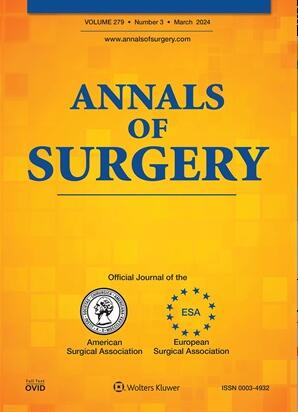Molecular Residual Disease and Recurrence in Rectal Cancer Patients Undergoing Upfront Surgery: A Prospective Cohort Study.
IF 6.4
1区 医学
Q1 SURGERY
引用次数: 0
Abstract
OBJECTIVE To evaluate the prognostic utility of postoperative circulating tumor DNA (ctDNA) for recurrence and treatment response in patients with rectal cancer undergoing upfront surgery. SUMMARY BACKGROUND DATA ctDNA-based molecular residual disease (MRD) testing shows promise in colorectal cancer, but its role in patients with rectal cancer not receiving neoadjuvant therapy is unclear. This study evaluates whether postoperative ctDNA predicts disease-free survival (DFS) and guides adjuvant chemotherapy (ACT) decisions. METHODS We analyzed ctDNA from patients with stage II-III rectal cancer (N=250) enrolled in the GALAXY study, multi-center registry in Japan. A clinically validated, personalized, tumor-informed 16-plex PCR-NGS assay (SignateraTM) was used to detect and quantify ctDNA. The primary outcome was DFS, defined as time from landmark to recurrence, death, or latest radiological assessment. RESULTS In the MRD window (2-10 wks post-surgery, before ACT), 14.2% (35/246) of patients were ctDNA-positive and had significantly shorter DFS (HR: 9.96, 95% CI: 5.76-17.2, P<0.0001). Among patients who were ctDNA-positive in the MRD window, a significant benefit from ACT was observed (HR: 0.28, 95% CI: 0.09-0.89, P=0.031), whereas no benefit was seen in ctDNA-negative patients (HR: 0.59, 95% CI: 0.26-1.35, P=0.211). When analyzing ctDNA dynamics from MRD window to 6-months post-surgery, recurrence risk was higher in patients who converted from ctDNA-negative to positive (HR: 8.22, 95% CI: 1.86-36.32, P=0.0055) and who remained ctDNA-positive (HR: 45.48, 95% CI: 14.31-144.57, P<0.0001) compared to serially ctDNA-negative patients. CONCLUSIONS Postoperative ctDNA status is a robust biomarker predicting recurrence risk and ACT benefit in patients with rectal cancer undergoing upfront surgery.直肠癌前期手术患者的分子残留疾病和复发:一项前瞻性队列研究
目的评价直肠癌术前患者术后循环肿瘤DNA (ctDNA)对复发和治疗反应的预后价值。基于actdna的分子残留病(MRD)检测在结直肠癌中显示出希望,但其在未接受新辅助治疗的直肠癌患者中的作用尚不清楚。本研究评估了术后ctDNA是否能预测无病生存期(DFS)并指导辅助化疗(ACT)决策。方法:我们分析了日本GALAXY多中心注册研究中II-III期直肠癌患者(N=250)的ctDNA。临床验证,个性化,肿瘤信息16-plex PCR-NGS测定(SignateraTM)用于检测和量化ctDNA。主要终点是DFS,定义为从里程碑到复发、死亡或最新放射评估的时间。结果在MRD窗口(术后2-10周,ACT前),14.2%(35/246)的患者ctdna阳性,DFS明显缩短(HR: 9.96, 95% CI: 5.76 ~ 17.2, P<0.0001)。在MRD窗口ctdna阳性的患者中,观察到ACT的显着益处(HR: 0.28, 95% CI: 0.09-0.89, P=0.031),而在ctdna阴性的患者中未见益处(HR: 0.59, 95% CI: 0.26-1.35, P=0.211)。当分析MRD窗口至术后6个月的ctDNA动态时,与连续ctDNA阴性患者相比,ctDNA阴性转化为阳性的患者(HR: 8.22, 95% CI: 1.86-36.32, P=0.0055)和ctDNA阳性患者(HR: 45.48, 95% CI: 14.31-144.57, P<0.0001)的复发风险更高。结论:术后ctDNA状态是预测直肠癌前期手术患者复发风险和ACT获益的可靠生物标志物。
本文章由计算机程序翻译,如有差异,请以英文原文为准。
求助全文
约1分钟内获得全文
求助全文
来源期刊

Annals of surgery
医学-外科
CiteScore
14.40
自引率
4.40%
发文量
687
审稿时长
4 months
期刊介绍:
The Annals of Surgery is a renowned surgery journal, recognized globally for its extensive scholarly references. It serves as a valuable resource for the international medical community by disseminating knowledge regarding important developments in surgical science and practice. Surgeons regularly turn to the Annals of Surgery to stay updated on innovative practices and techniques. The journal also offers special editorial features such as "Advances in Surgical Technique," offering timely coverage of ongoing clinical issues. Additionally, the journal publishes monthly review articles that address the latest concerns in surgical practice.
 求助内容:
求助内容: 应助结果提醒方式:
应助结果提醒方式:


